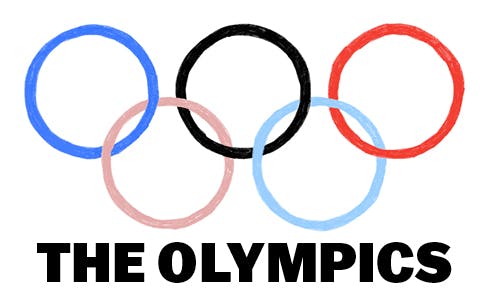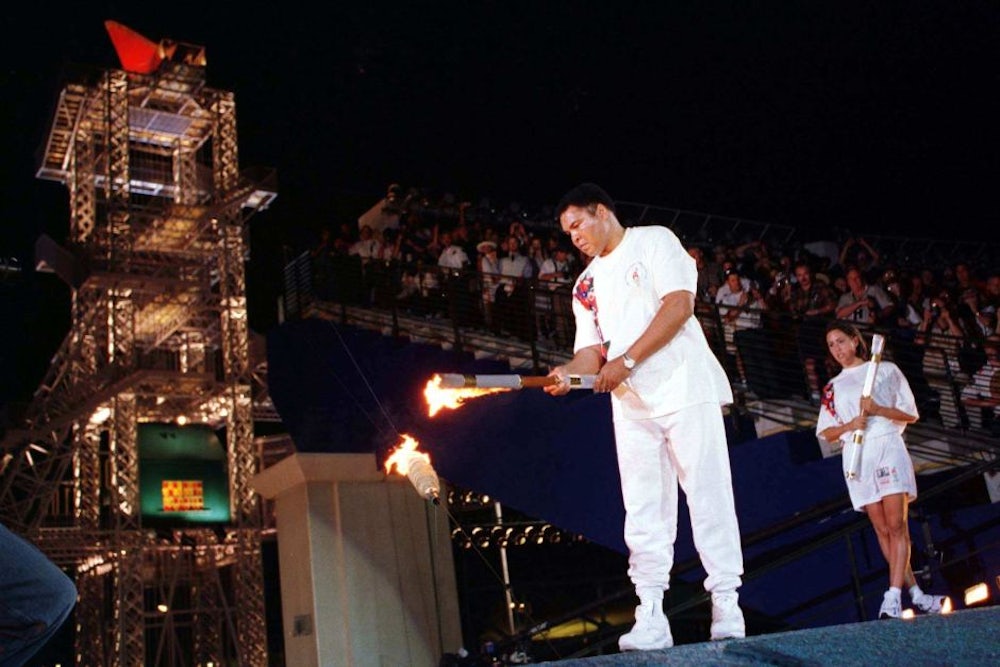
When I watched Muhammad Ali light
the Olympic cauldron during the 1996 Atlanta Games, I was eleven years old and
a recent immigrant to the United States. I had never heard of Muhammad Ali; I
didn’t know how agile he had once been inside the ring, or how witty and
outspoken he was outside of it. I didn’t know he had been nicknamed “The
Greatest,” but I intuited this by the way he looked like a forgotten angel,
receiving the flame. I seem to remember the commentators audibly gasped when the
camera zoomed in on Ali, as did all the adults in the living room. They were
seeing the boxer as he was, Ali the icon, but all I saw was a man stricken with
Parkinson’s disease, his placid expression impossible to read. He held the
torch alight with one steady arm while the other quaked uncontrollably. Muhammad Ali may have been a god once, but here
he looked merely mortal.
Perhaps this is the reason why, for me, the Olympics are permeated with a sense of irretrievable loss. Its celebrations mostly fill me with dread, as I brace myself to accept what time will undo. Every four years I watch helplessly like a glutton at the buffet: I’m stuffed but I can’t stop, because I know the hour is almost up. I know the same pyrotechnics won’t ever happen again at this same stadium, this same city. The hutongs and favelas bulldozed for the sake of the arena will never be rebuilt. Everything blooms in place for this singular event and there it will die.
Then there is the plight of the athletes, who, even as they glisten and saunter on the screen, undoubtedly in the best shape of their lives, nevertheless carry the guarantee of their decline. Afterwards, they will resume eating dessert, they will slacken, their muscles will atrophy. Their fame is just as fleeting: Most compete in wholly unrecognized amateur sports that require years of lonely and obscure exertion. And if they’re in that awkward cusp of age, perhaps in their early twenties, depending on the sport, they will most likely never return to the Olympic stage. The athletes know they have a thin sliver of time to take a shot at immortality; one mistake and it’s all over—entire childhoods gone in a roar of an instant. Even if they do manage to light up the boards, a tiny “world record” symbol next to their name, it may only last until the next heat before someone strikes it from the record; the difference is in the milliseconds. Then they will pack up, and go home.
The Olympics provides the most potent distillation of the impermanence of the human condition. If the afterlife provides a solace to the dying, then so too does the spectacle of sports. It makes sense that life-affirming displays of robust strength would be staged to counteract death. Sports historian Allen Guttmann has argued convincingly that modern sports derive from ancient rituals to secure the necessities of life—rain, crops, fertility—as well as to commemorate the dead. For the ancient Greeks, athletic contests were opportunities to see the divine made manifest. By witnessing the seemingly impossible—a jumper defying the laws of gravity, a wrestler overpowering another with superhuman strength—spectators could be reassured that there was indeed an immortal realm above. The Olympics are Aphrodite helping Hippomene win his foot race by distracting Atalanta; they are Athena heaving the discus just a little bit further for Odysseus.
The opening ceremony will be crammed,
predictably, with these pseudo-talismanic rituals. I’m sure few of us will be thinking,
what a rousing display of the warding off
of death. During the hour-long procession, athletes and spectators will wave
their cameras around with an archival mania, while millions of flashes twinkle galactically
from the stands. Once the cauldron is lit, we will all become participants in the
collective illusion. We will do this, I presume, because it is the same way we
bookend the events in our own lives. We will have the ceremony commensurate
with our fear.
